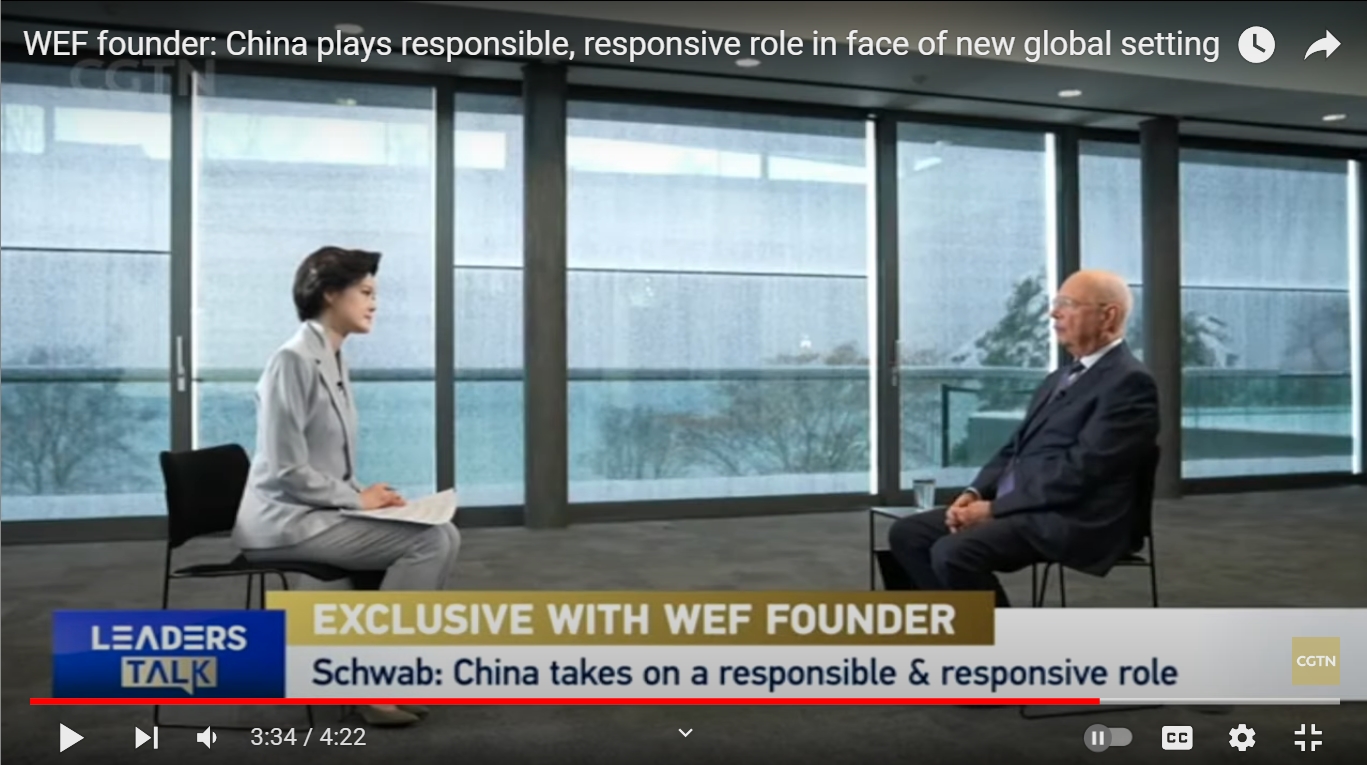
WEF founder Klaus Schwab was recently interviewed, sort of, by CGTN.com.
CGTN is China Global Television Network, an English-language news channel that is a division of China Media Group and China Central Television, all of which is part of the propaganda apparatus of the Chinese Communist Party. In 2017, Chinese Dictator Xi Jinping enjoined the just-established China Global Television Network to “tell China’s story well.” At the time, The Christian Science Monitor observed that CGTN would be “at the forefront of Beijing’s foreign propaganda offensive.”
It doesn’t seem offensive to Klaus Schwab, who gushes about China’s global stewardship in the interview.
Who is Klaus Schwab? Britannica says that he “is founder and executive chairman of the World Economic Forum, which he began in 1971. The WEF is most famous for its annual meeting in Davos-Klosters, Switzerland, which attracts leading business, government, and civil society leaders from around the world. He holds doctorates in mechanical engineering and economics as well as numerous honorary doctorates.”
As you read his words, try to keep in mind that nice-sounding, vague, uninformative, thought-killing generalities and people’s lives are two different things (“WEF founder: China plays responsible, responsive role in face of new global setting,” January 20, 2024):
In an interview with China Media Group (CMG), Schwab emphasized China’s significance in a world that has transitioned from a unipolar to a multipolar reality.
“We first have to recognize that the world has changed. The world has undergone or is undergoing those transformations. And here, particularly the transformation from a unipolar to a multipolar world. China has to play what I call and is playing a responsible and responsive role in this new global setting,” he said.
The world had changed. Fine. No dispute. Stipulated. The world has changed. Transformations have been happening.
Unipolar world has become multipolar. Hmm. Well, okay, but what does this mean, exactly? Is it about the demise of the Soviet Union, the rise of China, and the eight or ten or twenty years in between these events during which the world was “unipolar”? Or something?
China is playing a role in all this. It’s not just sitting on the sidelines. China is out there. In the “new global setting,” it is “playing a responsible and responsive role.” Which is what, exactly? What is its role? What is it doing? What are its goals?
It would be nice to get some elaboration of Schwab’s dull-witted spasms, but the above-quoted passage is two thirds of CGTN’s brief report on its interview with him. And if you go to the video of this interview (hosted on the same page), you find that there aren’t any leisurely disquisitions about details there either, although we do hear Schwab mention a couple of things that are not in the printed report, like the impending “shared global future.” So be sure to watch the video or you’ll miss the vapid genuflecting to “shared global future.”
But wait. That’s not all. In addition to what Schwab has to say in service of the CCP propaganda machine, we are exposed in the video to a clip from Xi Jinping’s transcendently wonderful speech at the World Economic Forum in 2017, a speech entitled “Jointly Shoulder Responsibility of Our Times: Promote Global Growth,” which, according to the video’s narrator, “greatly inspired a world that was shrouded in gloom.” A speech that Schwab says “has brought some sunshine into our discussions.”
The snippets from Xi’s 2017 speech really do inspire, and not just vomiting. For example, in this speech, Xi said, as translated: “World history shows that the road of human civilization has never been a smooth one and that mankind has made progress by surmounting difficulties. No difficulty, however daunting, will stop mankind from advancing.” This goes way beyond your average fourth-grade social studies class. Progress, we are being told, is achieved by surmounting difficulties.
Yes. Yes, that sounds right. Instead of just saying, “Well, this isn’t going to work out” when encountering difficulties, mankind instead surmounted the difficulties. Perhaps this is also the key to future progress?
Well, I agree. I agree with the evil totalitarian mass-murdering dictator of China. Who can disagree? Human progress requires not throwing in the towel in the face of problems but actually grappling with the problems. That’s—I mean, my God, Xi is absolutely right about this. When you’re right, you’re right. No wonder the world was slack-jawed with admiration when Xi gave this speech in 2017 at the World Economic Forum. It’s practically Will Durant’s eleven volumes of The Story of Civilization all over again, plus chapters one through thirty-nine of Mises’s Human Action.
Xi said, “When encountering difficulties, we should not complain about ourselves, blame others, lose confidence, or run away from responsibilities.” I encounter difficulties understanding this sentence when, for example, I consider real-life examples of difficulties with respect to which it would be appropriate to blame others. But it’s my fault. I must complain about myself here. I just don’t understand these kinds of sentences.
Then Xi told WEF that he wants us all to “take actions and march arm-in-arm toward a bright future.” Everybody in the WEF audience clapped approvingly.
But are they really ready to take the actions that the Chinese Communist Party is taking? Arm-in-arm? Are they really ready to “take actions and march arm-in-arm” against the Uyghurs and the Tibetans and Falun Gong and the Taiwanese, against countries unlucky enough to overlap the South China Sea, against Chinese who say a critical word about the CCP on social media, against Hong Kongers who object to China’s extermination of democracy and liberty in Hong Kong, against fugitives from China whom the CCP hounds to the ends of the earth?
Bright future for whom? Not the masses of men oppressed, imprisoned, tortured, and/or murdered by the Chinese Communist Party.





